|
|
|
Sort Order |
|
|
|
Items / Page
|
|
|
|
|
|
|
| Srl | Item |
| 1 |
ID:
165847
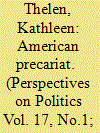

|
|
|
|
|
| Summary/Abstract |
The address situates the rise of “gig” work in the context of a much longer-term trend toward more precarious forms of employment. It explores the forces that are driving these developments and discusses the problems they pose at both the individual level and the national level. By situating the United States in a comparative perspective, it identifies the structural factors that exacerbate the problem of precarity and intensify its effects in the American political economy.
|
|
|
|
|
|
|
|
|
|
|
|
|
|
|
|
| 2 |
ID:
154390


|
|
|
|
|
| Summary/Abstract |
The transition from Fordist manufacturing to the so-called knowledge economy confronts organized labor across the advanced market economies with a new and more difficult landscape. Many scholars have suggested that the future of egalitarian capitalism depends on forging new political coalitions that bridge the interests of workers in the “new” and “old” economies. This article explores current trajectories of change in Denmark and Sweden, two countries that are still seen as embodying a more egalitarian model of capitalism. The authors show that labor unions in these countries are pursuing two quite different strategies for achieving social solidarity—the Danish aimed at equality of opportunity and the Swedish aimed at equality of outcomes. The article examines the origins of these different strategic paths and explores the distinctive distributional outcomes they have produced. The conclusion draws out the broad lessons these cases hold for the choices currently confronting labor movements throughout the advanced industrial world.
|
|
|
|
|
|
|
|
|
|
|
|
|
|
|
|
| 3 |
ID:
173638
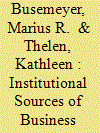

|
|
|
|
|
| Summary/Abstract |
Recent years have seen a revival of debates about the role of business and the sources of business power in postindustrial political economies. Scholarly accounts commonly distinguish between structural sources of business power, connected to its privileged position in capitalist economies, and instrumental sources, related to direct forms of lobbying by business actors. The authors argue that this distinction overlooks an important third source of business power, which they conceptualize as institutional business power. Institutional business power results when state actors delegate public functions to private business actors. Over time, through policy feedback and lock-in effects, institutional business power contributes to an asymmetrical dependence of the state on the continued commitment of private business actors. This article elaborates the theoretical argument behind this claim, providing empirical examples of growing institutional business power in education in Germany, Sweden, and the United States.
|
|
|
|
|
|
|
|
|
|
|
|
|
|
|
|
| 4 |
ID:
094751
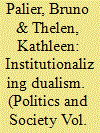

|
|
|
|
|
| Publication |
2010.
|
| Summary/Abstract |
The French and German political economies have been significantly reconfigured over the past two decades. Although the changes have often been more piecemeal than revolutionary, their cumulative effects are profound. The authors characterize the changes that have taken place as involving the institutionalization of new forms of dualism and argue that what gives contemporary developments a different character from the past is that dualism is now explicitly underwritten by state policy. They see this outcome as the culmination of a sequence of developments, beginning in the field of industrial relations, moving into labor market dynamics, and finally finding institutional expression in welfare state reforms. Contrary to theoretical accounts that suggest that institutional complementarities support stability and institutional reproduction, the authors argue that the linkages across these realms have helped to translate employer strategies that originated in the realm of industrial relations into a stable, new, and less egalitarian model with state support.
|
|
|
|
|
|
|
|
|
|
|
|
|
|
|
|
| 5 |
ID:
162658
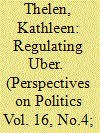

|
|
|
|
|
| Summary/Abstract |
I use the case of the transportation network company Uber as a lens to explore the comparative politics of the platform economy in Europe and the United States. Within the advanced capitalist world, different countries have responded in very different ways to this new service, from welcome embrace and accommodating regulatory adjustments to complete rejection and legal bans. I analyze Uber’s arrival and reception in the United States, Germany, and Sweden, documenting three very different responses to this disruptive new actor. I show that conflicts over Uber centered on different issues in the three countries. These differences were consequential because the specific regulatory “flashpoints”that Uber provoked mobilized different actors, inspired the formation of different coalitions, and shaped the terms on which conflicts over Uber were framed and fought.
|
|
|
|
|
|
|
|
|
|
|
|
|
|
|
|
| 6 |
ID:
080920
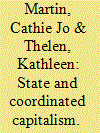

|
|
|
|
|
| Publication |
2007.
|
| Summary/Abstract |
This article investigates the politics of change in coordinated market econo\mies, and explores why some countries (well known for their highly cooperative arrangements) manage to sustain coordination when adjusting to economic transformation, while others fail. the authors argue that the broad category of "coordinated market economies" subsumes different types of cooperative engagement: macrocorporatist forms of coordination are characterized by national-level institutions for fostering cooperation and feature a strong role for the state, while forms of coordination associated with enterprise cooperation more typically occur at the level of sector or regional institutions and are often privately controlled. although these diverse forms of coordination once appeared quite similar and functioned as structural equivalents, they now have radically different capacities for self-adjustment.
The role of the state is at the heart of the divergence among european coordinated countries. a large public sector affects the political dynamics behind collective outcomes, through its impact both on the state's construction of its own policy interests and on private actors' goals. although a large public sector has typically been written off as an inevitable drag on the economy, it can provide state actors with a crucial political tool for shoring up coordination in a postindustrial economy. the authors use the cases of denmark and germany to illustrate how uncontroversially coordinated market economies have evolved along two sharply divergent paths in the past two decades and to reflect on broader questions of stability and change in coordinated market economies. the two countries diverge most acutely with respect to the balance of power between state and society; indeed, the danish state-far from being a constraint on adjustment (a central truism in neoliberal thought)-plays the role of facilitator in economic adjustment, policy change, and continued coordination
|
|
|
|
|
|
|
|
|
|
|
|
|
|
|
|
|
|
|
|
|